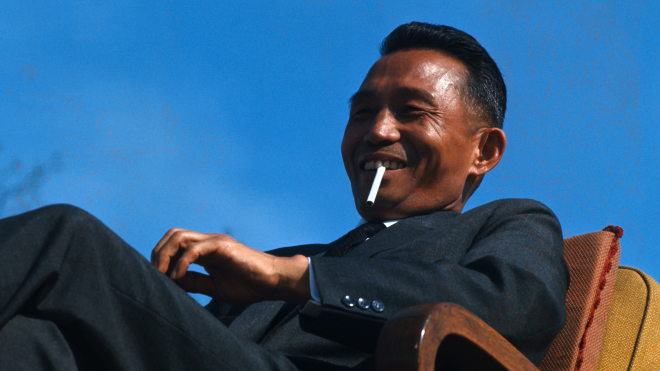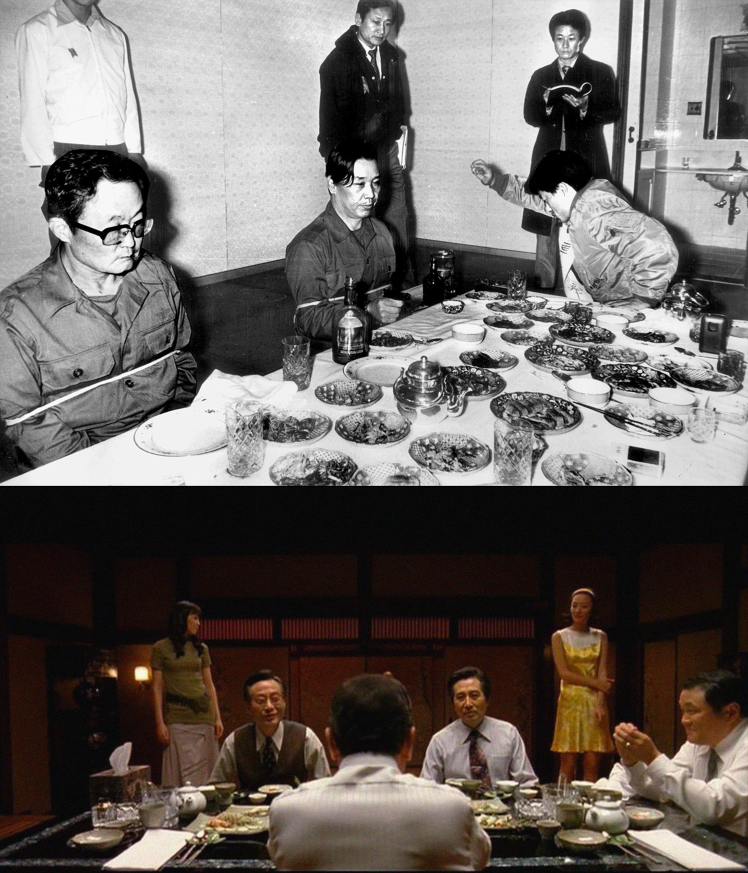In the photo above: Reconstruction of Park Chung-hee’s murder during the investigation, 1979. In the photo below: A scene from the 2005 film "The President's Last Bang" about Park Chung-hee’s assassination.
«Бабель»
On the evening of October 26, 1979, General Park Chung-hee had the last dinner of his life. He was accompanied by his bodyguard Cha Ji-chul, his chief of staff Kim Gye-won, and the chief of Korean secret police Kim Jae-gyu. Dinner was taking place in a strictly guarded part of the presidential palace.
Gradually, the conversation turned to mass protests in Busan, Parkʼs hometown. The president scolded the head of the secret police for not being able to properly deal with the public’s unrest and not dispersing the demonstration with paratroopers. Kim Jae-gyu objected that students were not the only ones participating in demonstrations. Thousands of ordinary citizens were joining them, and if they were suppressed by force, the protests could sweep the country. But Park interrupted him, saying that next time he would personally give the order to shoot them on sight.
An image of South Korean President Park Chung-hee (right) at an art gallery in Germany, 1965.
Keystone Features / Stringer / Getty Images
The presidential secretary tried to change the topic of the conversation, but the head of the presidential guard, Cha Ji-chul, added fuel to the fire. He called the head of the secret police spineless and added that if he were in his place, he would have ordered protesters to be crushed by tanks. President Park nodded in approval.
These jabs, made by the president and his bodyguard, infuriated Kim. He left the dining room, went up to the second floor, entered his office and took out a pistol. Descending, he ordered his subordinates to neutralize the presidentʼs guards. Then he returned to the table and shouted: "How can you listen to the advice of this unworthy worm?!" before trying to shoot Cha first, and Park second. His gun jammed.
Kim went to the next room, where his men were dealing with the presidentʼs guards, and borrowed the weapon from one of his bodyguards. Using it, he found Cha hiding in the bathroom and finished him off. Then he “executed” Park with a headshot.
Six people died that evening: the president, the head of his security, three bodyguards, and the presidentʼs driver. The only one who managed to survive was the head of the Presidential office Kim Gye-won.
In the photo above:A Walther PPK pistol, jammed while Kim Ke Won's was trying to murder Park Chung-hee. In the photo below: Smith & Wesson Model 36 pistol Kim Ke Won used to finish Park Chung-hee off.
Park Chung-hee, a former army general who fought in the Korean War, ruled South Korea for almost 18 years. He came to power after a military coup in May 1961. During that time Park promised that the military would return power to civilians as soon as they put everything in the country in order. It meant putting an end to corruption and organized crime, and carrying out economic reforms.
At first, Park promised not to participate in the presidential elections in the fall of 1963. But a few months before the elections he changed his mind, and eventually defeated his rival by a narrow margin. According to the Constitution valid at that time, he could be elected president not more than twice. But at the end of his second term Park staged a referendum that allowed him to be re-elected for the third time in 1971. After that he introduced a countrywide state of emergency and legitimized the new Constitution, which made it possible for the president to gain even more power and to be elected not by direct vote, but by a board of voters for an unlimited number of terms.
Military parade of the South Korean army with a giant portrait of Park Chung-hee in the background. October 1, 1973.
Wikimedia
Park Chung-hee is called "the father of the Korean economic miracle". Under his leadership, South Korea began to transform from an agrarian country destroyed by the Korean War into a thriving high-tech economy. Park introduced "state-controlled capitalism". concept. The Chebols, family corporations that received privileges and benefits from the state in exchange for a clear implementation of government tasks, thrived under him. Among the most famous Chebols are Samsung, LG, Hyundai, Daewoo and other companies.
By the early 1970s Park Chung-hee established a brutal dictatorship in the country. His regime was accompanied by mass political repressions, violent crackdowns on demonstrations, media censorship, and criminal liability for criticizing the government.
Park Chung-hee survived several attempts on his life, one of which killed his wife in 1974. After that, Park limited the circle of communication as much as possible. He rarely appeared in public. He turned his personal bodyguards into an army unit with military equipment. Its head, Cha Ji-chul, was given such broad powers that he became the second person in the country.
Security service agents escort Mun Se-gwang who tried to shoot South Korean President Park Chung-hee with a revolver at the National Theater in Seoul on August 15, 1974. The president's wife was killed in the assassination attempt. Mun Se-gwang was sentenced to death.
Paul Popper/Popperfoto / Contributor
This severely worsened the relations between Park and his longtime associates. Kim Jae-gyu was one of them. In the mid-1940-s, Park Chung-hee and Kim Jae-gyu studied together at the Korean Military Academy. After Park came to power, Kim became one of his closest associates. He advised him in presidential campaigns and brutally suppressed protests against Park across the country. Finally, in 1976, he became the head of the Korean Secret Service. At that time, it was essentially a secret police, engaged in intelligence and counterintelligence, repression of the opposition, bribery and pressure on the media.
After killing Park, Kim went to Chief of Staff Chong Son Hwa. He hoped that Chong would support him and declare martial law in the country. By that time, Chong had learned the details of the ordeal from the only surviving participant in the dinner, the head of President’s secretariat Kim Gye-won. Kim Jae-gyu and his accomplices were arrested and sentenced to death.
Kim Jae-gyu (second from left) during the trial that sentenced him to death. May 1980.
Wikimedia
Korean historians are still arguing why Kim Jae-gyu killed his longtime friend and patron Park Chung-hee. The main theories are:
- An unplanned murder in the heat of passion. This version is supported by the fact that Kim did not first check whether his pistol was in good condition and could not hit the target from close range the first time;
- The planned assassination of the "enemy of democracy". That was the version Kim himself insisted on during the trial, stating that the 1972 constitutional coup was the last straw;
- Kim planned to seize power himself. Thatʼs what the official investigation concluded;
- The US CIA is behind Parkʼs assassination. This theory is supported by the fact that Kim cited the worsening US-Korean relations as one of the reasons for the assassination. Historians presume Kim may have counted on American support in the event of a successful coup, but the US denies any involvement.
About two million people took to the streets during Park Chung-heeʼs funeral. But, as observers noted, "neither the people nor the officials were filled with sincere sorrow." In early December 1979, Prime Minister Choi Kyu-hah was appointed acting head of state. He promised to prepare a new Constitution, return the general presidential election and free political prisoners. But he did not manage to stay in the office for long. Soon, a new military coup took place in the country. It was organized by one of Parkʼs allies ― the head of military intelligence, General Chon Du Hwang.
The next democratic presidential election took place in South Korea only in December 1987. From this moment the modern period in the countryʼs history, the Sixth Republic, began.
«Babel» needs support from its readers now more than ever. If the work we do is important to you, please, send us a donation!
South Korean President Park Chung-hee’s funeral in Seoul. October 1979.
Alain MINGAM / Contributor
Translated from Ukrainian by Yana Sobetska.


